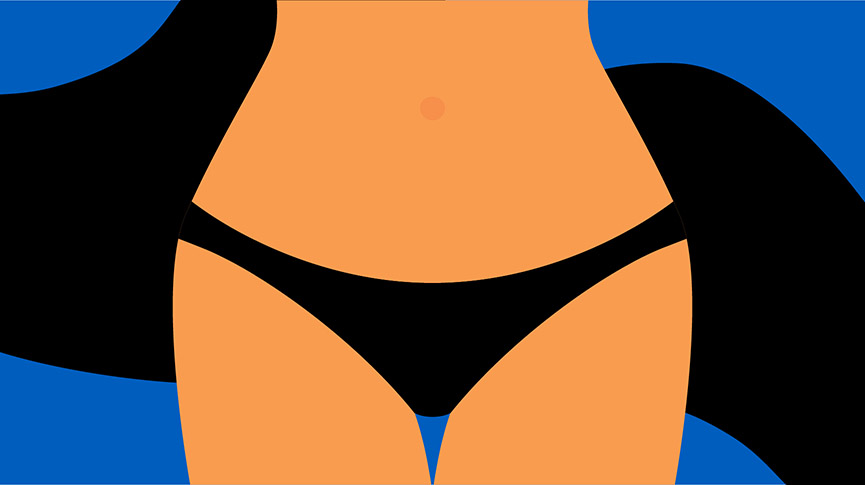Choosy Grooming: Bikini Care Guide

Whether you love it, hate it, or anything in between, it’s probably safe to say that we’ve all dealt with the dread of a less-than-perfect bikini line. Ingrown hairs, razor burn, bumps, discoloration… all reasons we might hide behind a cover-up rather than frolic freely.
The annoying truth is, our bikini area is very sensitive and will be affected by what we use around it and how we treat it. Growing up, nobody talked to me about the proper way to care for such a delicate part of my body, and I don’t recall any of my friends having that conversation either.
Anatomy 101
It’s important to note a few things anatomy-wise when tending to your sensitive area. Simply put, vagina and vulva are not the same. Vagina = inside, vulva = outside. It’s pretty common knowledge these days that douching is a no-go and can disrupt the pH of the vagina. Well, the same is true for a lot of other products that are specifically marketed as formulated for use on the female genital area.
What NOT to do
Fragrance, harsh soaps, and cleansers that contain perfumes and other chemical ingredients can be highly irritating to delicate tissues, further contributing to an anything but attractive bikini line.
So, you guessed it, step 1 in caring for your bikini line is to omit anything that might be irritating the overall area. In general, be wary of harsh chemical detergents, dryer sheets, synthetic fragrance, and dyes. More specifically, avoid perfumes and scented soaps/lotions. The New York Times offers helpful advice from Dr. Jen Gunter that reads:
“Vulvar pH is around 5.3 and water is 7.0. It is best that any soap or cleanser you use have a pH between 5.3 and 7.0 as regular exposure to a higher pH could damage the lipid layer on the surface of the vulva.”
“Soap can dry the skin and scents — even botanicals — can irritate it. A mild unscented soap, such as a pure glycerin soap, or a cleanser (a nonsoap product) is best, but use them sparingly. Special feminine cleansers are not needed and many have fragrance that could be irritating. A hypoallergenic facial cleanser can be used, but many women are also happy with just water.”
What exactly is an ingrown hair and how is it caused?
According to the Mayo Clinic, “an ingrown hair occurs when a shaved or tweezed hair grows back into the skin.” Being that our pubic hair is typically more coarse and curly, it has a higher chance of curling back into the skin when removed. What is the best way to avoid these pesty little guys? Keep reading!
Routine
Wash, exfoliate, dry, moisturize.
- Dr. Gunter covered washing, but to sum it up once more, wash vulva daily with either water alone or a mild, unscented, pure soap or cleanser.
- Regular exfoliating (3-4x/week) keeps skin healthy and pores clear and unclogged. It also gets rid of dead skin cells reducing the likeliness of ingrowns. You can use an exfoliating mitt, body brush, or a homemade sugar scrub made of equal parts sugar and oil. If you’re a product guru and would rather buy something, make sure to steer clear of those harsh ingredients we talked about and opts for a natural, mild, gentle, minimal ingredient exfoliant.
- Yes, drying off should play a vital role in your grooming routine. Moist areas are particularly prone to bacterial growth, so whether you choose to wash with water alone or a mild cleanser, it’s imperative to make sure you’re completely dry before dressing!
- Moisturizing: Be sure not to skip this step! It’s important to moisturize after shaving. Make sure to use an unscented, alcohol-free moisturizer. Aloe vera, pure shea butter, and coconut oil are all great natural options. An anti-inflammatory cream or oil with vitamin E would be a great option as well!
Other basic tips to prevent ingrown hairs:
- Avoid tight workout clothes post grooming. Rubbing from tight clothing can create inflamed follicles.
- Avoid tweezing.
- Let it breathe. Don’t keep your bikini area trapped in tight underwear or clothing when it’s not necessary.
- Wear 100% cotton underwear.
- Stay hydrated!
Shaving
Pros: quick, easy, accessible at all times, essentially free
Cons: razor burn, ingrowns, bumps
Tips: Always use shaving cream. Reach for one with minimal and natural, moisturizing ingredients. This gives your skin the proper buffer it needs for your razor. Stoke the razor in the same direction of hair growth and make sure you’re using a SHARP blade by replacing head every 2-3 uses if using disposable. Avoid hot water directly after shaving.
Waxing
Pros: lasting results, less shower time, gets hard to reach places
Cons: ingrowns, (temporarily) painful, can be costly, regrowth
Tips: Exfoliate before you go. Do not shave in-between visits (hair has to be grown out enough to be waxed, this is why regrowth can be a con). Dodge visits around your period, you will feel the pain much more.
Sugaring
Pros: all-natural, less painful, quick, can be done at home
Cons: can be difficult to find a place that offers this service, regrowth, can be pricey
Tips: Great option for those with sensitive skin. To make at home, all you need is sugar, water, and lemon juice.
Laser
Pros: drastically reduces hair growth
Cons: cost, longer process
Tips: Make sure your technician is certified to do the procedure, as laser treatment is not taught in medical school and requires further training.
Fill us in
Find a to-die-for bikini razor? Create an all-natural exfoliant that you just can’t bare to keep to yourself? Dying to tell someone about the organic moisturizer that saved your sensitive skin? Leave a reply below and let us know what new tips and tricks you discover. Your fellow bikini-season lovers will be glad you did 😉

Bailey is a soon-to-be new mom who goes against the grain. With a degree in communication studies, she has built a skincare company alongside her partner, which represents her lifestyle: natural, holistic, and non-toxic. Re-learning everything she knew her entire life, she began to grow her knowledge for all things natural. As an advocate for truth and women’s empowerment, her passion for writing and sharing her knowledge began to mature. Here at Intimina, she shares her experiences with pregnancy, sexual wellness, and women’s health from the perspective of a non-Western view.



According to Schubert, frequent waxing can lead to uneven skin tone and discoloration. To minimize this, take a break from waxing when you can, and exfoliate and moisturize in between sessions, she says.
Tummy time is essential for your baby s growth. Learn the what, when, and why s, as well as tips and tricks for helping your baby love tummy time.
Thanks for helping me understand that we should avoid scented lotions. With that in mind, I should really look for organic products to avoid chemicals. I just need to find the best products to lighten and smoothen my intimate areas which I have been insecure about ever since I was a teen.
Genuinely thought I was the only girl who felt immense pain when shaving stubble. All my friends shave every day, thought I was weird.
Can’t lie but this has been really helpful..